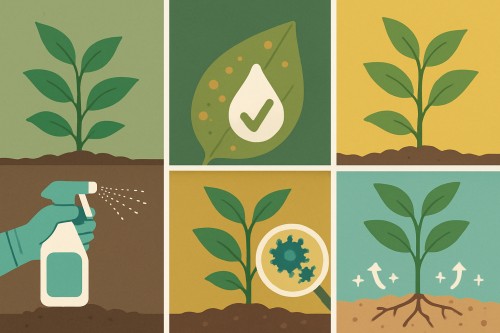


Water-soluble neem oil offers safe, eco-friendly pest control with broad-spectrum efficacy and improved plant coverage.
Because it is compatible with water, water-soluble neem oil makes application easier and does not require emulsifiers. Better absorption by pests and equal distribution on plant surfaces are made possible by this feature. Improved foliar coverage and fewer clogged sprayers are advantageous to farmers.
In 2023, the demand for water-soluble neem oil among organic producers increased by 45%, demonstrating both its efficacy in pest management and its reputation as an environmentally friendly product. Its non-greasy formula doesn’t leave any residue, promoting consumer safety and sustainable agriculture.
Water-soluble neem oil works through contact and ingestion. When pests feed on treated plants, azadirachtin disrupts their life cycle by stunting growth and reproduction. Its bitter taste and repellent properties deter many pests from even landing on crops.
Among the most affected pests are:
Neem-based insect control supports integrated pest management strategies in both organic and conventional farming systems.
Neem oil that dissolves in water is safe and adaptable to a variety of crops. Due to its non-toxic formulation, plants can be used repeatedly without harm.
During the busiest pest seasons, a 2024 study of 150 organic farms in Europe found that yields of treated vegetables increased by 35%.
Proper application techniques are crucial to maximize the benefits of neem oil. The recommended dilution is typically 5-10 mL of neem oil per liter of water. Ensuring complete coverage on both sides of leaves improves pest contact.
Agitate the mixture before and during application for even dispersion. Consistency prevents pest resistance and maintains the efficacy of the treatment.
Neem oil presents several ecological advantages. It is safe for beneficial insects when applied correctly and degrades quickly without polluting soil or waterways.
The Environmental Protection Agency (EPA) classifies neem oil as safe for agricultural use. It is certified for organic farming in both the United States and the European Union.
Its low toxicity to humans and animals allows for safer handling and promotes biodiversity in farming environments. Neem oil’s environmental footprint is minimal compared to that of synthetic pesticides.
Neem oil’s water solubility increases the effectiveness of its application. It promotes improved plant respiration and light absorption, guarantees uniform mixing, and avoids oily residues.
Water-soluble neem oil demonstrated insecticidal efficacy for up to 14 days following application, despite varying humidity levels, as reported in a study published in the International Journal of Agricultural Science (2023).
Farmers value its user-friendliness and reliable outcomes in a variety of crop systems.
Neem oil demands consistent application timing and correct dosage. Overuse can lead to phytotoxicity in sensitive crops.
Storage and usage considerations include:
Farmers often integrate neem oil with other biological controls for a more robust pest management approach.
“Nature itself is the best physician.” — Hippocrates
Farmers from various areas emphasize the dependability of neem oil. After using neem oil for an entire season, a vegetable cooperative in India saw a 50% decrease in aphid infestations.
In comparison to chemically treated crops, neem-treated areas showed higher populations of beneficial insects and healthier soil biodiversity, according to a 2024 study by the University of Wageningen. Farmers also reported lower total expenses for pest control.
Numerous studies attest to the effectiveness of neem oil. After seven days of neem oil treatment, the number of Colorado potato beetle larvae was reduced by 60%, according to a study published in the Journal of Pest Science (2022).
Applications of neem oil reduced greenhouse whitefly reproduction rates by 70%, according to the U.S. Agricultural Research Service.
